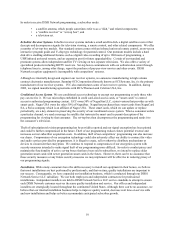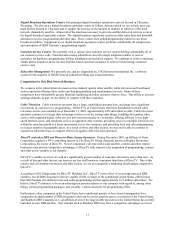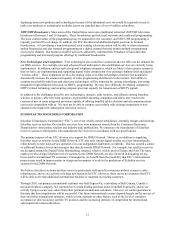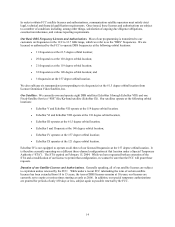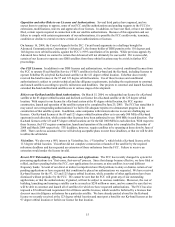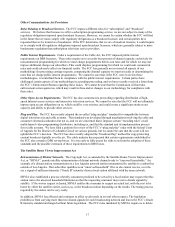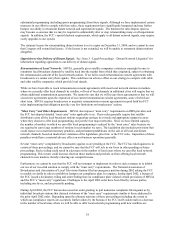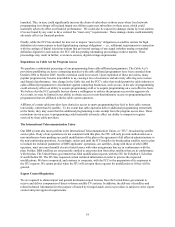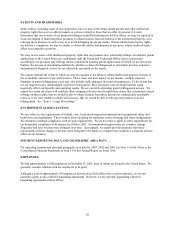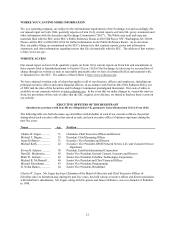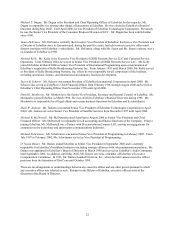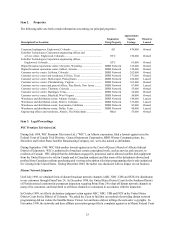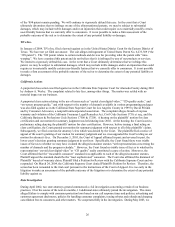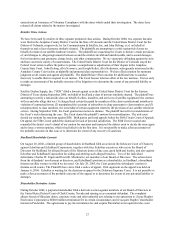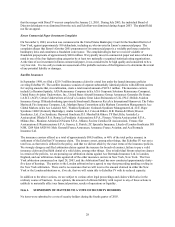Dish Network 2003 Annual Report Download - page 24
Download and view the complete annual report
Please find page 24 of the 2003 Dish Network annual report below. You can navigate through the pages in the report by either clicking on the pages listed below, or by using the keyword search tool below to find specific information within the annual report.19
launched. This, in turn, could significantly increase the churn of subscribers in those areas where local network
programming is no longer offered and impair our ability to gain new subscribers in those areas, which could
materially adversely affect our financial performance. We could also be exposed to damage claims by local stations
if we are found by any court to have violated the “must carry” requirements. These damage claims could materially
adversely affect our financial position.
Finally, while the FCC has decided for now not to impose “must carry” obligations on satellite carriers for high
definition television stations or dual digital/analog carriage obligations — i.e., additional requirements in connection
with the carriage of digital television stations that go beyond carriage of one signal (whether analog or standard
definition digital) for each station, the FCC still has pending rulemaking proceedings on these matters. These
proceedings may result in further, even more onerous, digital carriage requirements.
Dependence on Cable Act for Program Access
We purchase a substantial percentage of our programming from cable-affiliated programmers. The Cable Act’s
provisions prohibiting exclusive contracting practices with cable affiliated programmers have been extended from
October 2002 to October 2007, but this extension could be reversed. Upon expiration of those provisions, many
popular programs may become unavailable to us, causing a loss of customers and adversely affecting our revenues
and financial performance. Any change in the Cable Act and the FCC’s rules that would permit the cable industry or
cable-affiliated programmers to discriminate against competing businesses, such as ours, in the sale of programming
could adversely affect our ability to acquire programming at all or to acquire programming on a cost-effective basis.
We believe that the FCC generally has not shown a willingness to enforce the program access rules aggressively.
As a result, we may be limited in our ability to obtain access (or non-discriminatory access) to programming from
programmers that are affiliated with the cable system operators.
Affiliates of certain cable providers have denied us access to sports programming they feed to their cable systems
terrestrially, rather than by satellite. To the extent that cable operators deliver additional programming terrestrially
in the future, they may assert that this additional programming is also exempt from the program access laws. These
restrictions on our access to programming could materially adversely affect our ability to compete in regions
serviced by these cable providers.
The International Telecommunication Union
Our DBS system also must conform to the International Telecommunication Union, or “ITU”, broadcasting satellite
service plan. If any of our operations are not consistent with this plan, the ITU will only provide authorization on a
non-interference basis pending successful modification of the plan or the agreement of all affected administrations to
the non-conforming operations. Accordingly, unless and until the ITU modifies its broadcasting satellite service plan
to include the technical parameters of DBS applicants’ operations, our satellites, along with those of other DBS
operators, must not cause harmful electrical interference with other assignments that are in conformance with the
plan. Further, DBS satellites are not presently entitled to any protection from other satellites that are in conformance
with the plan. The United States government has filed modification requests with the ITU for EchoStar I, EchoStar
II and EchoStar III. The ITU has requested certain technical information in order to process the requested
modifications. We have cooperated, and continue to cooperate, with the FCC in the preparation of its responses to
the ITU requests. We cannot predict when the ITU will act upon these requests for modification or if they will be
granted.
Export Control Regulation
We are required to obtain import and general destination export licenses from the United States government to
receive and deliver components of direct-to-home satellite TV systems. In addition, the delivery of satellites and
related technical information for the purpose of launch by foreign launch services providers is subject to strict export
control and prior approval requirements.



